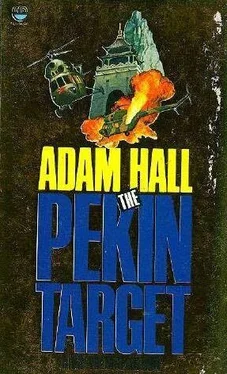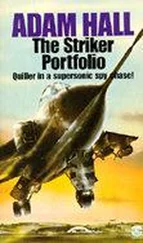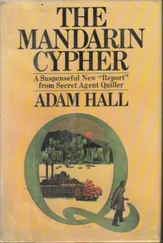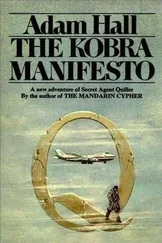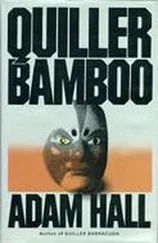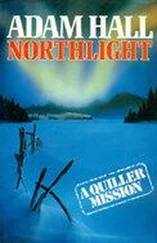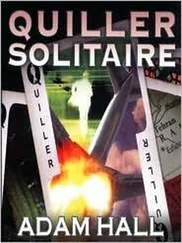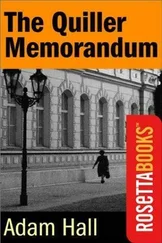But there weren't any. It was the evening of the next day and for seventeen hours I'd been stuck in here while Tung's Triad were carefully lining up the next shot in Seoul or Pekin or Tokyo, the next step in the destruction of Chinese-American relations and Chinese-American-Japanese triangle diplomacy.
Tung was powerless to do anything, I knew that. The KGB never let him go near the radio console unless two interpreters were also there; he couldn't send a signal to his Triad, ordering them to postpone the three final assassinations in the hope that the Bureau could find his son. I couldn't get near the radios myself, and even if I could, Tung would be listening, and in any case I'd got nothing definite to tell Ferris; two of the three people on the death list were likely to be the US Charge d'Affaires in Pekin and the Japanese Ambassador; the third was certain to be the Premier of the People's Republic of China, though his death would have to suggest natural causes: the Soviets wouldn't want China's ostensible responsibility for these assassinations to extend to the killing off of her own; but Tung's scenario of a pro-Russian general's assuming power in China would obviously require the Premier out of the way.
It wasn't easy to play with my bricks while somewhere a telescopic rifle was swinging into the aim with an innocent man's head in the cross-hairs.
Tung Kuo-feng, I'd written on a ten won note, and on the other side in English: Urgent we talk again. I'd waited until Yang's relief had taken over the guard outside my cell and given the note to him, tapping my finger on Tung's name; he'd gone off with it but I doubted if Tung ever received it; Yang had a particular hatred for me but the others had the look of the executioner on their faces whenever they came into the cell; I'd killed one of their own and they were all hoping I'd try running for it.
At noon they'd brought me some bean curd in a small black iron cooking-pot; it was still on the floor, empty — a lethal weapon, except that they never came in without a submachine gun levelled at my heart; and if I could ever close up on one of them I knew better ways to do it than with a saucepan.
The bell was chiming again at the far end of the courtyard, and in the narrow slit in the thick stone wall I could see a powdering of the dusk darkening the leaves of the acacia trees. The wooden clappers began soon afterwards, and the low monotone of chanting voices. When it was over, Yang came on duty again, throwing open the big tumbler lock and pushing the door inwards with his gun and looking at me with his black eyes narrowed as if in contemplation; I don't think he was just trying to play on my nerves; I think he wanted to look at me and go through in his imagination what he would finally do with me. The bruise on his throat had darkened, though not so much perhaps as the bruise on his pride: he should have been quicker out there in the courtyard last night.
He backed away until he was in the stone passage outside, then jerked his gun in a sign to me to go with him.
Colonel Igor Sinitsin was in the operations room with his aides, Tung Kuo-feng and the interpreter.
"I want to know if your people have started to act on the disinformation you gave them last night."
While I waited for the translation I noted that Major Alyev and Captain Samoteykin had their right hands in the pockets of their sports coats, even though Yang was standing behind me with his submachine gun; I was close enough to Tung to reach him, and they'd seen what I'd done to Yang last night. Killing Tung was the only workable method of destroying their operation and they knew that I knew that, though I wasn't so sure he needed their protection: I could still remember the impact of that subtle force that had thrown me against the wall of his private chamber.
He said: "Call your Embassy. What sign can they give us if they find my son?"
This was why I'd tried to see him. Even if Ferris wanted to risk sending us a signal he wouldn't be able to do it: one of these sets was kept open for transmissions direct from Moscow and the other for the Triad to report on progress with their continuing operations.
"All right," I said and pressed down the transmit lever. An English voice answered this time, and Ferris came to the Embassy radio within fifteen seconds.
"Jade One."
"Eagle to Jade One. If you find the objective, get a USAF fighter to make a low-altitude pass over the monastery."
"Understood, but we've made no progress yet. This is a tough one."
I began using speech-code. "Keep talking, and put in the names Pyongyang and North Korea, also President Kim Sung, with a neutral background."
After three sentences I turned to Tung. "Over to you."
He spoke to the interpreter and I heard the three names being spoken at roughly the same intervals used by Ferris. While I waited I tried to think how to slip in a warning to Ferris on the three next victims of Tung's operation, but there wasn't a chance, and in any case the deadline was up and the first one was probably on the ground by now with a hand outstretched and the security guards keeping the crowd back and the ambulance siren fading in, and nothing I could do about it except watch Tung Kuo-feng from the corner of my eye and try to work out a murderously fast attack that would take him down on top of me as a shield when they opened up with their guns.
But I would have to change my thinking on that. With this heavy a guard at the monastery I had no chance of getting away; the only chance for Jade One was to find Tung Chuan and try to free Kuo-feng and set him up in a world spotlight and have him expose the Soviets; in no other way could the damage to Chinese-American relations be repaired. Even if a chance came, I musn't kill him now.
I heard Sinitsin saying: "Five members of the Japanese Red Army will assist in the mock overthrow of President Kim Sung, and a few of his guards will be shot for the sake of appearances. These men are now on their way from Tokyo by commercial airliner."
When Tung spoke, it seemed to me that he was using precisely similar cadences and intervals as in the original Russian, and I admired his skill; he used names and speechcode, as he'd heard me do, but when his totally dissimilar message came it carried a brute shock.
"The American Charge d'Affaires has just been ambushed and shot dead in Pekin. You must find my son. The next action is scheduled for noon tomorrow."
I pushed down the transmit lever, sickened, and gave the message to Ferris. There were people above Croder in London, all the way up to the Prime Minister, though he could short-circuit them and reach her direct if he had to. And by now she'd be asking questions as the slaughter went on.
The British Foreign Secretary, the American Ambassador, the passengers on board that airliner and now the American Charge d'Affaires. Have you replaced the agent in the field?
No, Prime Minister. He's close to the opposition now.
How close?
Very close. Within reach of an act of sanction.
A pause on the line while she considered, watching the rain on the window. Then what is holding him up? The tone severe as she demanded of Croder, and Ferris, and the agent in the field to do what they were paid to do, and to do it now.
There are difficulties, ma'am. The agent's position is hazardous in the extreme.
He's alone?
Yes.
Can't you invoke assistance from others? From NATO forces in the area, for instance?
While the rain ran down the window and the red buses swayed through the streets, and the pigeons huddled along the parapets, as Big Ben chimed the hour, and the agent "in the area" sat in his sweat at the radio console feeling as Impotent and as incompetent as that clear and admonishing voice declared that he was.
Читать дальше
